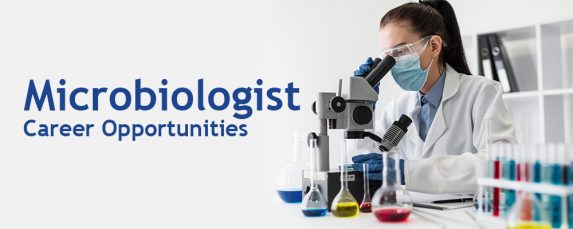Microbiologist – A Blog on Career Opportunities
Microbiologists are exciting career profiles that occupy a crucial role in understanding the concept and execution of the world of microorganisms. These microscopic organisms include …
Read MoreThe study of all living organisms that are too small to see with the naked eye is known as microbiology. This comprises bacteria, archaea, viruses, fungus, prions, protozoa and algae, generally known as 'microbes'. These bacteria are essential in nutrient cycle, biodegradation/biodeterioration, climate change, food spoilage, disease causation and control, and biotechnology.
We aim to place all of our students in desired government professions. The classes are handled expertly by qualified faculty. One of the stepping stones on our path to success is high-quality teaching.
Microbes are essential to all life on Earth. They play an important role in a variety of biochemical processes, including biodegradation, biodeterioration, climate change, food spoilage, epidemiology, and biotechnology.
General Microbiology, Biochemistry, Molecular Biology, Immunology, Food Microbiology, Industrial Microbiology, Medical Microbiology, Dairy Microbiology, Fermentation technology, Bioinstrumentation.
B.Sc. degree / M.Sc. in Microbiology at the postgraduate level.
18-36
Age relaxation - OBC 3 years, SC / ST 5 year
Aerobic and Anaerobic Culture Method
Antibiotic Sensitivity Tests
Bergey’s Manual of Systematic Bacteriology
Classification Of Bacteria
Cultivation of Bacteria-Culture Media and Method
Diauxic and synchronous growth
Extremophiles
Gliding motility and amoeboid motion
Identification of Bacteria
Industrial Microbiology
Microbial Diversity
Microbial Photosynthesis
Nutritional types of bacteria
Staining reactions
Testing of Disinfectants
Viral replication
Antibiotic Sensitivity Tests
Antibiotic-Mechanism Of Action
Chemotaxis, Phototaxis And Other Taxes
Continuous And Batch Culture
Cultivation Of Viruses – Methods
Disinfectants – Mode of Action
Fungi – properties and classification
History and scope of microbiology
Immunology of Malignancy
Measurement of bacterial growth
Microbial growth curve
Morphology And Structure Of Bacteria
physical and chemical methods
Sterilization – Principle And Methods
The General Structure of Viruses
One of the most active and important fields in microbiology is medical microbiology, which deals with diseases of humans and animals. Medical microbiologists identify the agents causing infectious diseases and help plan measures for their control and elimination.
To pursue this programme you need to have a B.Sc. degree in Microbiology, Botany, or Zoology. You can apply for PhD or M. Phil programmes after a postgraduate degree in Microbiology with minimum 50% aggregate marks.
Various reputed jobs are available in government departments and institutions under group C and group B. Just like other government profiles, this one also requires candidates to qualify for a written examination and then a personal interview.

Microbiologists are exciting career profiles that occupy a crucial role in understanding the concept and execution of the world of microorganisms. These microscopic organisms include …
Read More
It is an excellent opportunity for healthcare professionals to work abroad. Overseas experience brings sufficient exposure for career growth and personal/professional development. The healthcare profession …
Read More
This post is a short take on the concept of a dataflow with a focus on its requirements and document verification process. The article covers …
Read More